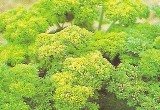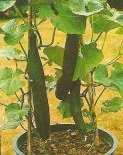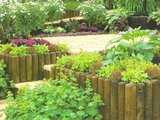|
Organic Herb Garden - No Vegetable Garden Should be Without OneAn organic herb garden is essential mainly because it drives pests away. It does this in 2 ways:
The French marigold herb for instance is one of the best pest repellant herbs. And it should be planted in every vegetable plot and every entrance to the garden. Herbs are also healthy. Almost every herb has medicinal properties which can be passed on to us when we add them in our foods. Lavender for example is a well known agent of aromatherapy. It’s also known from assisting in controlling acne and other skin diseases. So if you think about it… There are more benefits to having an organic herb garden. You’ll be spending less
fussing over pest control. And you’ll also be improving your health by consuming these herbs. Could this mean fewer trips to the doctor and pharmacy? Of course it can. So read on and we’ll explain the 2 types of herbs and the best location for planting each. Annual herbsAnnual herbs are best grown…
...so that their scents can be released when you brush against them. See the below illustration… 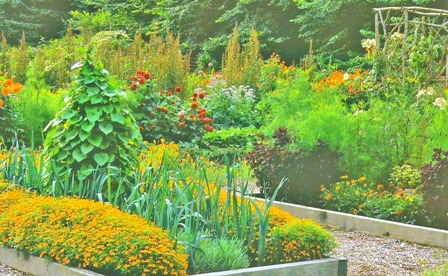 See how the vegetables are planted between the marigold organic herb garden? This layout makes it almost impossible for pest to attack the crops. Annual herbs also grow best when they are planted directly into the soil and not transplanted. Containers and pots tend to restrict their growth. So it’s best to sow them directly into the soil. So make space for them when planning the layout of your vegetable beds. Annual Herbs also prefer the warmer seasons. Thus…mid spring is the ideal time for sowing when cold winds and frost begin to disappear. The Top 2 Annual Herbs for your Organic Herb GardenBorage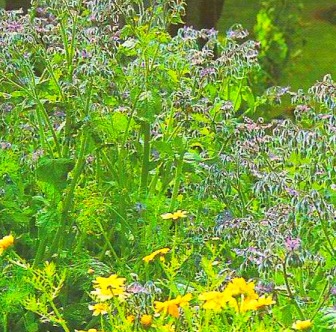 Borage attracts beneficial insects like bees and also adds flavor to meals. So they're great for your organic herb garden. They grow as tall as 60 to 90cm tall (2-3ft) and that’s pretty tall. So it’s best to plant them on either northern or southern sides of your vegetables. If they’re planted on the eastern or western sides they’ll block out the sunlight. It’s also better if you sow borage seeds 45cm (18in) apart. That’s so they don’t compete with each other. MarigoldAs mentioned above… No garden should be without marigold. The pungent scent of this herb repels pests naturally. Marigold grows to 60cm tall and should be sown in close to the entrance of the vegetable garden. They can also be sown in the pathways and borders of beds. That’s so their scents can be release when they’re touched. Marigolds do best when sown in early spring to early autumn. And better yet…once in bloom this herb self seed itself to increase its population.
Perennial Herbs In your Organic Herb GardenPerennial herbs are less fussy than annual. By that I mean…they do well in poorer, drier soil than annual herbs. In fact… Perennial herbs basically requires
That’s why we encourage you to grow those walls as a form of protection. You can also use cloche to shelter young and upcoming perennial herb. We also encourage you to get young perennial herbs to start your garden instead of starting from seeds. This is simply because they tend to grow better and more quickly. How to Get PerennialsStart looking around your neighborhood. Does anyone else have an organic herb garden? Do they have perennial herbs growing there? If they do…then why not pay them a visit? But don’t go empty handed. Carry something of your own and propose a trade. Be sure to walk with a garden knife to cut and divide the herb plants. We must warn you though… Don’t cut or divide perennial herbs in autumn or winter. Remember we explained earlier that the damp and cold weather affects these types of herbs? Therefore… Cutting and dividing them during these months will further weaken the plant and even kill them. So wait until spring rolls along before you go have that talk with your neighbors. So Here are 5 of the Perennial Herbs That we Recommend for Your Organic Herb GardenLavender Lavender is a precious herb to have in your garden. The scent it produces attracts beneficial bees and butterflies. They grow between 30 cm and 90cm (1-3ft) and come in a variety of colors and sizes. They also add some scenery to the vegetable garden. RosemaryRosemary also attracts beneficial insects (especially bees) and repels pests. They make great hedges if well kept and can even survive the winter months. They grow up to 60cm tall and do best in warm spots against walls with well drained soil. SageSage also grows up to 60cm and need replacing every few years. That’s because they are usually resistant to pruning. Nonetheless… Sages are aromatic plants and it is these odors that confuse pests. The scent of the sage camouflages the scent of the vegetables that the insects are after. So they’re too are great defense mechanisms. Lemon BalmLemon balm do great against weeds only when they are planted closely together. The ideal spacing being 45cm. At this distance the lemon balm herbs take away the nutrients of the soil from weeds. And are far apart so that they don’t compete to strongly against each other. They grow up to 45cm in height (18in) and there yellow leaves bring color to the garden. MintThis is a strong scented herb. So we know immediately that it’s great for repelling pest. As a matter of fact…the extract from this herb is actually used in most insect repellants. So they are most suited for an organic garden. However this herb may prove difficult to control. Their roots spread at alarming rates. So we never grow them with other herbs. This decreases completion for root space and lowers completion among the herbs. What you can do however is to plant them in containers or pots that are sunken into the ground. Additionally, ensure that the rim of the pot or container is above the surface. This ensures that the roots don’t escape into the open soil. On the other hand… Mint makes a great ground cover for a vacant plot of land that’s not yet occupied with vegetables. The mint will spread naturally thereby keeping the population of weeds to a minimum and also protecting the soil from leaching and dehydration.
So here we have 7 herbs in total for protecting your vegetable garden from pest. We have the annuals that are planted around the beds. And we have the perennials that are planted around the perimeter of the entire garden. But don’t limit your garden to only the herbs listed above. There are many more herbs out there. Just remember to choose those that are aromatic in order to mask the attractive scents of fresh vegetables. Move from Organic Herb Garden to Organic Pest Control
OR
|






